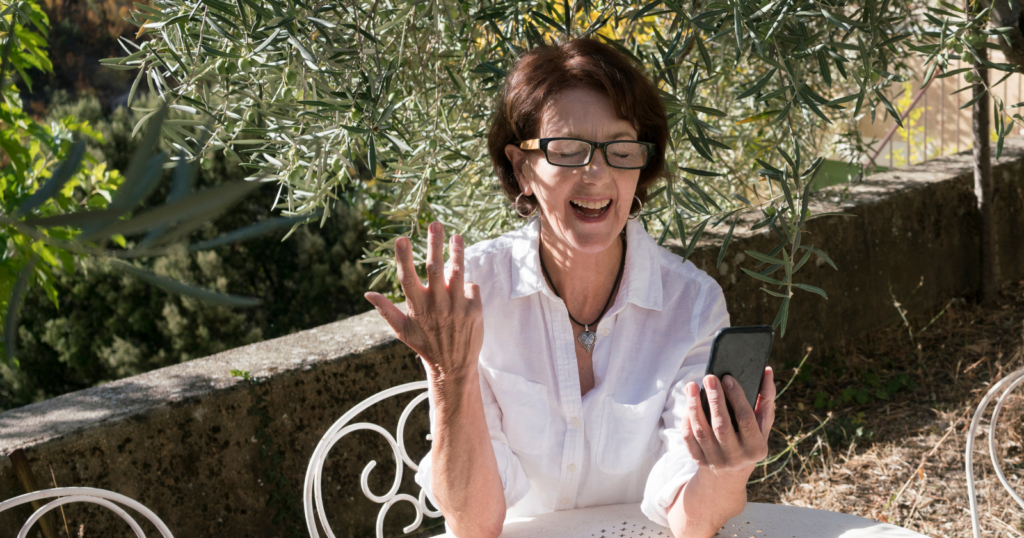We’ve all been there. You open a text from your parent or older colleague and you can’t help but chuckle.
They’ve just committed a classic “boomer” texting faux pas that instantly reveals their age.
While it’s not a bad thing, it’s definitely amusing to see how different generations use technology differently.
And, according to psychology, these habits are not just random, they’re deeply rooted in the way each generation has adapted to the digital age.
In this light-hearted look at 7 boomer texting habits that instantly give away their age, we’ll delve into why these habits exist and what they say about the person behind the screen.
Don’t worry, it’s all in good fun and may even help bridge the digital gap a little.
So, whether you’re a boomer looking to update your texting game or a millennial seeking to understand your parents’ cryptic messages, read on and enjoy the ride!
1) The overuse of punctuation…!!!
Who can forget the excitement of receiving their first text message? For many boomers, it was a thrilling new way to communicate.
And they brought with them their old-school writing habits, like the excessive use of punctuation.
Psychologist Dr. Albert Mehrabian, renowned for his groundbreaking work on verbal and non-verbal communication, once said, “Inconsistent messages create tension and distrust.”
For the younger generation, multiple exclamation marks or question marks can feel just that – inconsistent with the casual, understated tone of digital communication.
When you see a text filled with punctuation marks, you can bet it’s from a boomer who is still stuck in the letter-writing era, where emphasis relied heavily on these symbols.
The irony is, in trying to emphasize their point, they often end up creating confusion or unintentionally raising the emotional stakes.
So next time you receive a text filled with exclamations or question marks, remember – it’s not an emergency. It’s just a boomer trying to make a point…!!!
2) The ellipsis mystery…
I remember the first time I received a text from my dad that ended with “…”. It was a simple message: “See you at dinner…” I was puzzled.
Was there something ominous about this dinner? Was he upset with me?
Turns out, it was just a boomer thing. For them, the ellipsis is a natural pause, a way to indicate that the conversation is to be continued.
But for younger generations, it can come across as passive-aggressive or indicative of an unfinished thought.
Famed psychologist Carl Jung once said, “Everything that irritates us about others can lead us to an understanding of ourselves.”
It’s important to remember this when we encounter these generational communication gaps.
So, if you’ve ever found yourself over-analyzing a text from a boomer that ends with an ellipsis… don’t worry. It’s not you. It’s just their way of keeping the conversation open and casual.
3) The formality factor
Ever wondered why your boomer parents or colleagues text as if they’re writing a formal letter?
Here’s the raw truth: Boomers grew up in an era where written communication was much more formal.
For them, proper punctuation and grammar aren’t just about clarity; they’re a sign of respect and consideration for the reader.
Dr. David Matsumoto, a renowned psychologist with expertise in emotion and non-verbal communication, has said, “The more we understand the behavior of people from different cultures or generations, the more we can empathize with them.”
This formality in texting may feel stiff or redundant to younger generations, but for boomers, it’s a way of showing respect.
So, when you receive that ‘Dear’ or ‘Kind Regards’ in a text from a boomer, know that it’s their way of maintaining decorum, even on a casual texting platform.
4) Emojis – a foreign language?

Emojis have become an integral part of digital communication, adding emotion and nuance to our otherwise flat textual messages.
But for many boomers, this colorful language can be a bit perplexing.
A study by the University of Michigan found that older adults had difficulty interpreting emojis. This gap in understanding can lead to miscommunication, especially when younger texters use emojis as a form of shorthand. A simple thumbs-up emoji might be misconstrued as sarcasm, or the infamous laughing-crying emoji might be taken literally.
So, if your boomer friend or family member seems to ignore your carefully selected emojis or responds with a classic smiley face ‘:)’, don’t fret.
They’re just trying to navigate the ever-evolving world of digital communication in their own way.
5) The signature sign-off
Growing up, I always knew who had left me a voicemail without even having to listen to it. My mom would always end with, “Love, Mom.” It turns out, this habit has translated into her texting.
Many boomers have a habit of signing off their texts as if they were letters. They’ll add a ‘-Dad’ or ‘-Susan’ at the end of their messages, even though we clearly know who it’s coming from.
Psychologist Daniel Goleman highlights the importance of emotional intelligence and empathy in communication. He says, “Emotional intelligence begins with understanding your own emotions and the ability to manage them.”
While it might seem unnecessary to us, this sign-off could be their way of creating a personal connection in the digital space.
So, when you get a text signed ‘-Mom’ or ‘-Uncle Bob’, just smile and appreciate their earnest attempt at making digital communication a bit more personal.
6) The longer, the better?
In a world where brevity is king, boomers often stand out with their long text messages. While we’re used to short and snappy texts, boomers seem to prefer typing out lengthy paragraphs.
Here’s the counterintuitive part: despite the extra time it takes to read these lengthy texts, they may actually be a good thing.
According to psychologist Susan Krauss Whitbourne, “The key to effective communication is a mutual understanding of the information being shared.”
Boomers are used to detailed conversations, and they bring this habit into their texting. While it might seem excessive, they’re just trying to ensure there’s no room for misunderstanding.
So next time you receive an essay-like text from a boomer, remember – they’re just trying to communicate effectively in their own way.
7) The capital offense
Ever received a text from a boomer in ALL CAPS and thought they were shouting at you? You’re not alone.
Psychologist Albert Bandura’s social learning theory suggests we learn behaviors by observing others. Boomers, however, didn’t have the luxury of learning digital etiquette in this way.
In their world, CAPS means emphasis, not yelling. They’re simply trying to stress a point.
So, the next time you get a capital-heavy text from a boomer, don’t take it as a sign of anger. It’s just their unique way of highlighting what’s important.
Final reflections
The nuances of human communication are as varied as the people involved in it.
Our foray into boomer texting habits has been enlightening, revealing how different generations adapt to technology in their unique ways.
Behind every ellipsis, capital letter, and formal sign-off is a boomer trying to navigate the digital age while staying true to their communication roots.
These habits, while amusing to spot, remind us of the diversity of human expression and the importance of understanding.
They serve as gentle reminders that empathy and patience go a long way in bridging communication gaps, be it generational or otherwise.
So, next time you spot a classic ‘boomer text’, smile, appreciate the difference, and remember – every text is a small reflection of the sender’s journey through the digital era.







